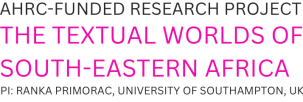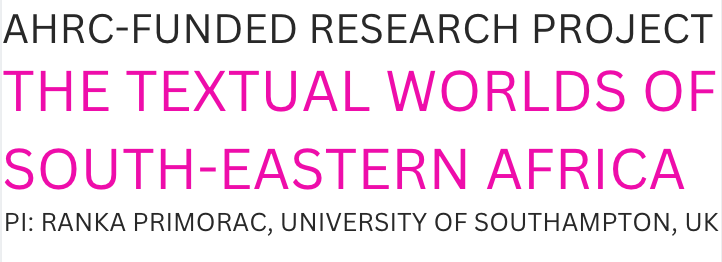The Textual Worlds of South-Eastern Africa Network calls for papers on
Disobedient Forms
In the last decade or so, the global recognition of African literary cultures has skyrocketed. A fresh wave of texts and authors has attained visibility in the world literary sphere: some have emerged from previously overlooked literary nation-states, bringing into focus new cultural contexts and local antecedents; many are adept at negotiating the tension between publishing in the global north while also addressing reading publics in Africa. At the same time, local and regional literary actors (authors, publishers, festivals, writers’ collectives, magazines, archival initiatives, consecrating institutions and more) are finding innovative ways of funding and promoting their work. Since the Covid pandemic, the internet has become established as a mainstream literary event venue, publishing outlet and marketing tool for African writing.
Fresh critical vocabularies are needed to make sense of this fast-shifting literary terrain. The distinction between (conventionally understood) ‘extroverted’ or ‘world’ African literature, and the literary productions variously designated as ‘introverted’, ‘popular’ and ‘local’ is fast becoming blurred. What constitutes an African text’s worldliness?
The AHRC-funded Textual Worlds of South-Eastern Africa network comprises Ranka Primorac (University of Southampton), Grace Musila (University of the Witwatersrand), Brendon Nicholls (University of Leeds), and Lynda Spencer (Rhodes University).We are organising a two-day workshop titled Disobedient Forms at the Stellenbosch Institute of Advanced Study (STIAS) in South Africa on the weekend of 9-10 April 2022, and we are inviting 300-word abstracts from scholars based in south-eastern Africa interested in fully-funded in-person participation (if circumstances allow). We welcome papers on how the region’s texts and forms disobey – i.e. invite a re-thinking of – conventional designations related to the worlding, circulation, and prestige of south-eastern Africa’s literary texts, processes and networks. Comparative approaches are particularly welcome. We encourage (but do not limit participation to) critical engagements with the following aspects of south-eastern Africa’s literary spectrum:
- The distinction between ‘mainstream’ and ‘popular’ (or: official and unofficial, as Karin Barber puts it) literary texts, genres, and media. The recent rise to international visibility of some African thrillers, chick lit and speculative fiction means that the conventional distinction between ‘popular’ and ‘properly literary’ African genres is freshly blurred. What are the contemporary and historical instances of such blurring in south-eastern Africa? How is this binary contrast complicated by internet texts and genres? How has the idea of the local as ‘unofficial’ been institutionally deployed and/or challenged in south-eastern Africa? Are there official instances of ‘the unofficial’ and how do they help to regulate the idea of ‘African literature’? In what ways may unofficial ways of reading be said to be worldly?
- The idea of ‘world literature’ and south-eastern Africa’s literary systems and networks. For Franco Moretti, world literature involves the circulation of texts and forms between the economic centres and peripheries of the capitalist world-system. For Sara Marzagora, on the other hand, African literature itself is a a multilingual palimpsest of literary connection and disconnection, whose worldliness need not be pegged to globalist thinking. How do literary systems operating on different geo-cultural scales intersect and combine in south-eastern Africa? What kinds of readerly competence does the overlapping of networks in different languages produce in the region? What is the world-literary significance of writing in indigenous languages? How has the combination of form, language and race historically affected the canonical status of texts and genres in the region
- Regional concepts of worlds and world-making. For Pheng Cheah, the world is ‘a form of relating or being-with’. What is the relationship between orality (both urban and rural), literariness, and world-making in south-eastern Africa? How may oral texts and genres circulating in the region be related to world literature? How may print, oral and/or electronic networks dovetail and combine? Does south-eastern Africa export literary elements (of any kind) to the wider world (including the global North), and is it possible to trace the historical trajectories of such movement? Who decides when textual elements are deemed ‘irreconcilable’ (as per Moretti), and how? Please send expressions of interest and 300-word abstracts to [email protected], with ‘Disobedient forms’ as the email subject, before 28 February 2021. Recipients of full conference funding will be notified by mid-March.
*
Some suggested readings:
Barber, Karin A History of African Popular Culture, Cambridge UP, 2018.
Beecroft, Alexander, ‘World Literature without a Hyphen’, New Left Review 54, 2008, pp. 87-100. See also the monograph An Ecology of World Literature, Verso, 2015.
Cheah, Pheng, ‘What is a World? On World Literature as World-Making Activity’, Daedalus, 137 (3), 2008, pp. 26-38. Available at https://direct.mit.edu/daed/article/137/3/26/26755/What-is-a-world-On-world-literature-as-world?searchresult=1. See also the monograph What is a World, Duke UP, 2016.
Julien, Eileen, ‘The Extroverted African Novel’ in Franco Moretti (ed), The Novel, Vol I: History, Geography, Culture, Princeton UP, 2006, pp. 667-700
Marzagora, Sara, ‘African-language literatures and the “transnational turn” in Euro-American humanities’, Journal of African Cultural Studies, 27(1) 2015, pp. 40-55
Moretti, Franco ‘Conjectures on World Literature’, New Left Review 1, 2000, pp. 54-68. Available at https://newleftreview.org/issues/ii1/articles/franco-moretti-conjectures-on-world-literature
WReC, Combined and Uneven Development: Towards a New Theory of World-Literature, Liverpool UP, 2015.

